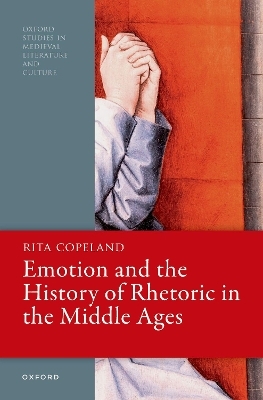
Emotion and the History of Rhetoric in the Middle Ages
Oxford University Press (Verlag)
978-0-19-890487-8 (ISBN)
Rhetoric is an engine of social discourse and the art charged with generating and swaying emotion. The history of rhetoric provides a continuous structure by which we can measure how emotions were understood, articulated, and mobilized under various historical circumstances and social contracts. This book is about how rhetoric in the West, from Late Antiquity to the later Middle Ages, represented the role of emotion in shaping persuasions. It is the first book-length study of medieval rhetoric and the emotions, coloring that rhetorical history between about 600 CE and the cusp of early modernity. Rhetoric in the Middle Ages, as in other periods, constituted the gateway training for anyone engaged in emotionally persuasive writing. Medieval rhetorical thought on emotion has multiple strands of influence and sedimentations of practice. The earliest and most persistent tradition treated emotional persuasion as a property of surface stylistic effect, which can be seen in the medieval rhetorics of poetry and prose, and in literary production. But the impact of Aristotelian rhetoric, which reached the Latin West in the thirteenth century, gave emotional persuasion a core role in reasoning, incorporating it into the key device of proof, the enthymeme. In Aristotle, medieval teachers and writers found a new rhetorical language to explain the social and psychological factors that affect an audience. With Aristotelian rhetoric, the emotions became political. The impact of Aristotle's rhetorical approach to emotions was to be felt in medieval political treatises, in poetry, and in preaching.
Rita Copeland is Professor of Classical Studies, English, and Comparative Literature and Sheli Z. and Burton X. Rosenberg Professor of Humanities at the University of Pennsylvania. She is author or editor of eight books and is a General Editor of the five-volume Cambridge History of Rhetoric. She has received grants and fellowships, including the Guggenheim, American Council of Learned Societies, National Endowment for the Humanities, and American Philosophical Society.
Introduction
1: Before the Middle Ages: Emotion from Invention to Style
2: Christian and Literary Rhetorics of the Early Middle Ages: Emotion as the Property of Style
3: Emotion in the Rhetorical Arts and Literary Culture c. 1070-c.1400
4: Aristotle's Rhetoric in the Latin West: The Fortunes of the Path?
5: De regimine principum: Emotion, Persuasion, and Political Thought
6: Political Poetics and the Aristotelian Turn: Dante, Chaucer, and Hoccleve
7: Preaching, Emotion, and the Aristotelian Turn
Epilogue: Mixed Rhetorics
| Erscheinungsdatum | 28.10.2023 |
|---|---|
| Reihe/Serie | Oxford Studies in Medieval Literature and Culture |
| Verlagsort | Oxford |
| Sprache | englisch |
| Maße | 155 x 235 mm |
| Gewicht | 658 g |
| Themenwelt | Geisteswissenschaften ► Sprach- / Literaturwissenschaft ► Anglistik / Amerikanistik |
| Geisteswissenschaften ► Sprach- / Literaturwissenschaft ► Literaturwissenschaft | |
| ISBN-10 | 0-19-890487-8 / 0198904878 |
| ISBN-13 | 978-0-19-890487-8 / 9780198904878 |
| Zustand | Neuware |
| Haben Sie eine Frage zum Produkt? |
aus dem Bereich


